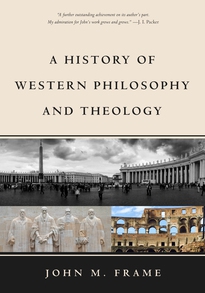Here is the Analytical Outline for the first 5 chapters of John Frame‘s upcoming title: A History of Western Philosophy and Theology. This title will be released later this month.
1. Philosophy and the Bible
a. Why Study Philosophy?
b. Philosophy, Theology, and Religion
c. Subdivisions of Philosophy
i. Metaphysics
ii. Epistemology
iii. Value Theory
d. Relations of the Three Subdivisions
e. Biblical Philosophy
i. Creator and Creature
ii. Absolute Tripersonality
iii. Lordship
f. Perspectives of Human Knowledge
g. Sin and Philosophy
h. Christian and Non-Christian Philosophy
i. The Antithesis in Metaphysics
j. The Antithesis in Epistemology
k. The Antithesis in Values
2. Greek Philosophy
a. Greek Worldviews: One and Many
b. The Greek Way of Worship
c. Philosophy, the New Religion
d. A Survey of Greek Philosophy
i. The Milesians
ii. Heraclitus
iii. Parmenides
iv. The Atomists
v. Pythagoras
vi. The Sophists
vii. Socrates
viii. Plato
ix. Aristotle
x. Stoicism
xi. Plotinus
e. Conclusion
3. Early Christian Philosophy
a. The Apostolic Fathers
b. The Apologists
c. Justin Martyr
d. Irenaeus
e. Tertullian
f. Clement of Alexandria
g. Origen
h. Athanasius
i. Augustine
i. Manichaeism
ii. Epistemology
iii. The Trinity
iv. Pelagianism
v. The City of God
vi. TheConfessions
4. Medieval Philosophy
a. Boethius
b. Pseudo-Dionysius
c. John Scotus Erigena
d. Anselm of Canterbury
i. Faith and Reason
ii. Monologium
iii. Proslogium
iv. Cur Deus Homo
e. Toward Scholasticism
f. Thomas Aquinas
i. Faith and Reason
ii. The Existence of God
iii. The Nature of God
iv. Epistemology
v. Language
g. John Duns Scotus
h. William of Occam
i. Eckhart von Hochheim
j. Epilogue
5. Early Modern Thought
a. The Renaissance
b. The Reformation
i. Martin Luther
ii. John Calvin
c. Post-Reformation Protestantism
i. Protestant Scholasticism
ii. Pietism
d. Rebirth of Secular Philosophy
e. Continental Rationalism
i. Rationalism and Empiricism
ii. René Descartes
iii. Baruch (Benedict) Spinoza
iv. Gottfried Wilhelm Leibniz
f. British Empiricism
i. Thomas Hobbes
ii. John Locke
iii. George Berkeley
iv. David Hume
g. Summary


Early October 2015 Presuppositional Apologetics Links | The Domain for Truth
-[…] 1.) A History of Western Philosophy and Theology by John Frame – Analytical Outline […]